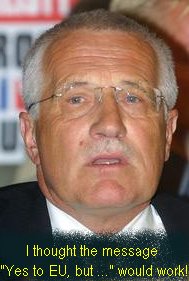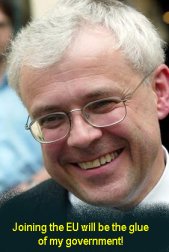Czech voters say NO to euronegativism (Pavel
Èernoch)
Prague, 17.6.2002 - The Czech parliamentary elections on 14/15 June have sent a clear signal to Europe: the aggressive campaign of Václav Klaus and his Civic Democratic Party (ODS), calling upon voters to rally behind “national interests” and to stop the “socialist menace”, has failed with an all-time low result of 24,47%. Voters sent a clear NO to the authoritative and self-centred political style of this former prime minister, who is remembered among European leaders as a euroskeptical Thatcherist who preferably liked to lecture others on how to decompose the EU into a mere free trade association. His numerous remarks on Europe have caused the legendary reaction of former Commissioner for Enlargement Hans van den Broek that: ”it is the Czech Republic who wants to join the EU and not the EU who wants to join the Czech Republic”.

The clear winners of the parliamentary elections are the Social Democrats with 30,20%. With a moderate, friendly and pro-European campaign they managed to convince voters of their ability and willingness to continue to run the country with responsibility. Their potential coalition partner, the Coalition (Freedom Union & Christian Democrats), entered the election campaign with the promise to bring change to the political deadlock. After four years of a social democratic minority government, which was held in power by an opposition agreement guaranteed by the ODS, the Coalition received a meagre result of 14,27%. This however wil
l be sufficient to form a coalition government with the ÈSSD with a narrow majority of one seat (101 seats out of 200). Moreover, this coalition would have a majority of senators in the upper chamber of parliament, a fact which would enhance its ability to pass laws.A coalition government of ÈSSD, US & KDU-ÈSL will restore political normality, which has been seriously disturbed in the past by a fait-accompli of the two biggest political parties and their representatives Václav Klaus and Miloš Zeman. The ne
wly designated Prime Minister Vladimír Špidla represents a change in political attitude and has received support from president Václav Havel for not being tempted to renew a political deal with the ODS (as his predecessor Zeman did). The discontent of many voters with a shady political deal of the two biggest democratic parties has lead to a low voter turnout of 58% and has given rise to many protest votes for the Communist party. The unreformed Communists have received an unprecedented 18,51% in the election, which makes them the third strongest political subject in the country. Even though many commentators are now calling for their inclusion into the democratic spectre of political life, it will be difficult to deal with a party proud of its totalitarian past.For Europe the Czech elections are good news, though. The parliamentary majority will be fragile, but the issue of entering to the European Union will likely provide the necessary glue for at least until 2004. It will be interesting to observe those political actors, who gained from the political deals of the past. Václav Klaus, not plagued by thoughts of taking responsibility and of resignation, might find it difficult to stay put in opposition alongside the Communists for a four year term. A skilled and power-conscious politician, he might be looking for designing ways of how to break up a fragile coalition effort to restore democratic forms of governance in the Czech political arena.
Pavel Èernoch, pcernoch@europeum.org